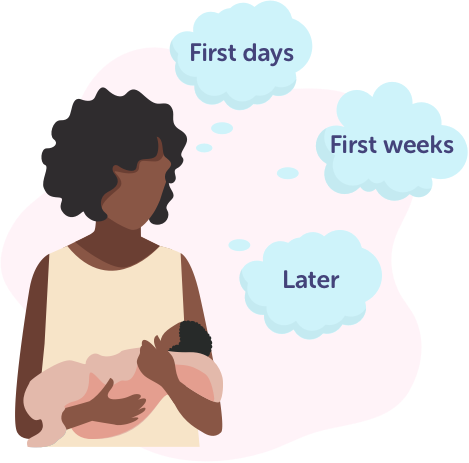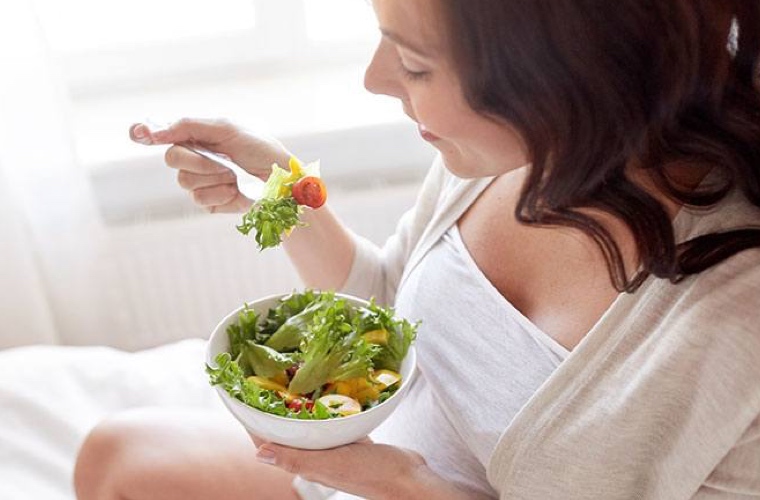In the NICU - Feeding
Breast milk
Breast milk is more than just food for your baby. It contains nutrients and many other ingredients that benefit your baby’s health. Breast milk is particularly valuable for babies born preterm, with a low birth weight or who are unwell.
We hope you will be able to provide your breast milk for your baby. If this was not your plan, we encourage you to chat with staff to work out how you can.
The first step is to provide your milk for your baby’s first feeds. In order to extend the advantage, the next step is to continue to provide milk throughout your baby’s hospital stay and later at home; but remember, even if you can only provide some milk for a short time, this is still valuable.

“Breast milk is more than just food.”
“Breast milk is particularly valuable for babies born preterm or with a low birth weight or who are unwell.”
“I planned to use formula, but I understand that my baby needs my breastmilk now, so I will do my best”
How breast milk helps your baby
- It is made by you to meet your baby’s specific needs - it is personalised nutrition and personalised medicine for your baby.
- It benefits your baby immediately and into the future.
- It is the best first food for your baby and is easy to digest.
- It helps your baby’s intestine (gut) to mature and tolerate feeds.
- It promotes your baby’s brain and neurodevelopment.
- It strengthens your baby’s immune system and helps protect them against infections.
- It helps protect your baby from the serious gut illness called necrotising enterocolitis (NEC).
- It helps your baby’s eye development and vision.
- It can be used to clean your baby’s mouth due to the anti-infective ingredients it contains. It also provides a pleasant taste.
- Feeding breast milk is associated with a shorter length of stay in hospital and a lower chance of re-admission to hospital in the first year.

Some interesting facts about breast milk

Breastfeeding
You make protective antibodies to infections that may be in the environment around you and these pass into your breast milk. When your baby receives your milk, they gain this extra protection. Skin-to-skin contact with your baby helps this process.
Providing breast milk helps release the feel-good hormone oxytocin. This has many benefits including inducing a sense of relaxation and wellbeing for both mother and baby.
The composition of your milk changes over time to meet your baby’s changing needs. Milk of mothers who deliver a baby preterm tends to be richer in some ingredients during the early weeks – nature’s way to help babies born preterm.
There is a dose response benefit to your baby from your milk. The more your baby receives the more they benefit, but even a small amount is better than none.

Probiotics are good bacteria that benefit the gut. Breast milk helps probiotics grow in your baby’s gut.
The goodness of breast milk and breastfeeding lasts a lifetime
The Health Service Executive (HSE) promotes that ‘Every breastfeed makes a difference’. It advises that every single drop of breast milk is good for your baby’s health and the longer you feed your baby with breast milk, the greater the health protection for you and your baby.
Medications and breast milk
Most medications are safe to use when providing milk for your baby. If not, a safe alternative can usually be found. If you take any medication, drug, herbal remedy, vitamin or other nutritional supplement, prescribed or otherwise, please let your baby’s doctor or pharmacist know.
Providing breast milk when your baby is in hospital can seem like hard work and may not be what you had planned, but most mothers also say that it is also hugely satisfying as is something important for their baby that only they can do.
“I’m so happy I expressed. I could see he liked my milk, and he has done so well.”
Quote from NMH Mum in NICU
Remember
Providing breast milk is worth the effort
Gather support!
Providing breast milk can take a lot of time and effort, especially in the early days. Partners, families, friends and staff can all help by providing practical and emotional support.
Family and friends can help by being your cheer leader and getting you nutritious meals and snacks. If you are expressing milk, they can also help with washing and sterilising equipment.
Staff are also available to guide and support you in the hospital and in the community. You may also be referred to a lactation or breastfeeding specialist for additional guidance.

Mum being guided to hand express breast milk
Sources of support and information about breastfeeding and expressing milk
A sample of the wide range of sources of support and information available is outlined here.
- Staff looking after you and your baby
- Lactation/breastfeeding specialists
- Public health nurses, general practitioners, dietitians
- Lactation/breastfeeding specialists – public (check with your local health centre) and private (listed at www.alcireland.ie)
- Volunteer breastfeeding counselors – mother to mother trained volunteers (e.g. Cuidiú www.cuidiu-ict.ie and La Leche League of Ireland www.lalecheleagueireland.com)
- Breastfeeding buddy system – volunteers with experience breastfeeding (e.g. Friends of Breastfeeding www.friendsofbreastfeeding.ie)
- Breastfeeding support groups – mother to mother support – check with your local health centre or online for a group near you
- The HSE website www.mychild.ie. Here you will find information about Expressing milk, Expressing milk for premature or ill babies and Breastfeeding babies and toddlers
- The HSE also offers online access to a lactation / breastfeeding expert
- HSE booklets ‘Breastfeeding and expressing for your premature or sick infant’ and ‘Breastfeeding, A good start in life’. These booklets are available to download at www.healthpromotion.ie
Look after yourself too!

Mum eating to provide her with energy when caring for her baby
It is important to look after yourself when you are providing milk for your baby.
This includes getting enough rest and sleep, drinking enough fluids (so you are not thirsty) and eating regular meals.
A poor diet does not affect the quality of your milk, but it can cause you to lack energy and have difficulty coping. While there is a lot going on, make time to rest and sleep too.
Stress, smoking and alcohol can have a negative effect on your milk supply. Use strategies to minimise stress as best you can. For further guidance, refer to the section ‘Coping with your baby in the neonatal unit’.
Remember
Support is available if you cannot provide your milk.
If you need to stop providing milk, staff will help you to work out a weaning plan to suit.
